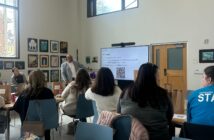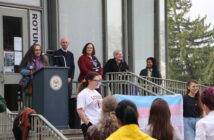
Jordan Wolman
I’ve heard those two words more times this semester than one might think.
I’ve seen professors and administrators refuse to reply to requests for comment over the recent lawsuit by Monica Miller, a former professor alleging sexual harassment and racism.
I’ve had students involved in Greek life decline comment when asked to share their experiences under investigation, past or present, so that the article’s narrative isn’t driven by the Dean of Students Office.
And then there’s my personal favorite, looking back to last semester. When the initial email went out announcing the demolition of Trembley and the elimination of on-campus housing for upperclassmen, I immediately called an office on campus that deals with student life.
When I asked my question to the woman who answered the phone, she told me she had no idea what email I was talking about and scolded me to “get my facts straight.”
You can imagine my frustration.
Why do we put up with the no comments, the ignored interview requests and, at times, even the insults? Why don’t we just publish with the people who will talk and never push to get the other side?
Because journalists tell stories. I feel it is one of my responsibilities to the public and for the public good to cover all corners, seek out the more hard-to-reach areas of the campus and community and foster an engaged citizenry.
On one hand, Lehigh being a private, often closed-door institution makes that journalism drive burn stronger, forcing us to keep pushing, keep asking questions. It has taught me that maybe to find the best storyline or information, you don’t go right to the top. Maybe you start with the students, with the lower-paid staff on campus to capture the true impact of a policy decision.
I’m not sure I’d want all the information and answers that I’m seeking to just be handed to me. That almost feels too easy. Journalism is hard work.
But truth be told, our school could use some transparency.
Our school could use some light.
We should all demand transparency and accountability from people in positions of power.
Unfortunately, most students on this campus have never met a member of the Board of Trustees, who for all intents and purposes make unchecked decisions on the school’s budget, hirings and overall funding decisions.
Most students don’t know the names of the Board’s members or how they even obtained the powerful position that they are in.
While Lehigh never promised its students a democratic form of governance when we first enrolled here and sent in our first deposits, is this really the type of leadership we want?
Is this the type of transparency and administrative oversight we want in a university?
That’s not to say that there aren’t good people working at this school. I’m hard-pressed to come across a professor I don’t like. The vast majority of Lehigh students I interact with are really nice, sociable people.
And yes, I’ve even found from administrators who I have interviewed, the discussion has been thorough and civil, and they now smile at me when they pass by me on campus.
But far too often, I am met with silence or no comment.
Now, do me a favor, play along with me just until the end of this piece.
Think of journalists through the lens of public servants.
Think about it: nobody has to be a journalist. The media has power, and journalists generally try and stay neutral and balanced through their reporting and writing.
So when a journalist approaches you asking for comment on a given topic, the journalist is giving you a chance to tell your story — to get your side out to the public, unfiltered. It is a megaphone you normally may not have had if not for this newspaper asking you about your story or experience.
Nobody wants to read a student conduct-driven story on Greek life or a lawsuit-driven Monica Miller story.
You don’t want to read it that way, and I don’t want to write it that way.
So help us be balanced and fair.
If you just think of it through that lens, maybe change will occur.
I would think twice before you decide not to share your narrative with the public.
For the administration, I would think twice before hiding behind your desk in Alumni Memorial. As an educational institution, we should all be doing our part to contribute to the free flow and marketplace of ideas. That’s what has made our country great for so long.
I would think twice before saying “no comment.”
Jordan Wolman, ’21, is the news section editor for The Brown and White. He can be reached at jmw221@lehigh.edu.





Comment policy
Comments posted to The Brown and White website are reviewed by a moderator before being approved. Incendiary speech or harassing language, including comments targeted at individuals, may be deemed unacceptable and not published. Spam and other soliciting will also be declined.
The Brown and White also reserves the right to not publish entirely anonymous comments.
2 Comments
“No Comment”, just kidding. I’m thinking you may have to be creative to get the truth in some cases. I assume people are often willing to tell the truth if their names are hidden. Then it’s your judgement call as to if it is the truth.
Sometimes neutral and balanced is not the same as balanced and fair. Reporting on a story can be accurate but the choice of stories may not be fair. This may be why some papers are called liberal and some conservative. I see The Brown and White (B&W) as liberal. The lack of conservative stories is evident as are stories about good that President Trump has done; I hear you laughing but it is true. Dumping on our president is too easy, probably truthful but basically unfair as there are many who back him, enough in the right places to get him elected.
I’m looking forward to a B&W article on the Board member who just donated to Lehigh.
I got a chuckle from your “get my facts straight” experience. Welcome to the concept of bureaucracy. If done well it can be efficient given circumstances but you may find many who don’t know or don’t care as well as those who don’t want “you” to know even if you care. If you can’t get stories, you may have to resort to editorials, as seems to be done often.
Jordan–what about OTR or deep background ? This piece is just whiny whiny whiny — if you are a serious journalist go AFTER the story and don’t let “no comment” get in the way. What about investigative journalism? Marty Baron would be rolling…